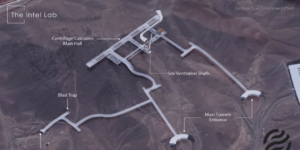Navigating the Tensions: Israel, Iran, and the U.S. Response on Nuclear Concerns
Introduction
In recent discussions between Israel and the Trump administration, a pressing issue has emerged: the future of Iran’s nuclear program. According to Israeli officials, Israel is requesting U.S. assistance to take decisive action against Iran’s Fordow uranium enrichment facility, a move that could have vast implications for global geopolitics.
The Fordow Facility: A Fortress Underground
The Fordow Fuel Enrichment Plant, often considered Iran’s nuclear crown jewel, is nestled deep within a mountain, making it a daunting challenge for any military operation. Israel has acknowledged its inability to neutralize this facility independently due to the lack of advanced military resources, specifically bunker buster bombs and large bomber aircraft. This reliance on the U.S. highlights a significant imbalance in military capabilities, illustrating why Israel sees the need for American intervention.

Image Source: Intel Lab Reconstruction
Advanced Intelligence Efforts
The discourse surrounding Fordow isn’t just about military strategy; it’s also about intelligence. The Intel Lab has provided intriguing insights into the facility through advanced three-dimensional reconstructions. Using information gleaned from Israeli intelligence operations, these visualizations are based on civil engineering principles and nuclear enrichment cycle fundamentals, showcasing the intricate layers of expertise involved in modern intelligence efforts.
Through this multi-disciplinary approach, analysts like the one known as @Orion__int have shed light on the depth of Iran’s nuclear capabilities, further informing Israel’s strategy. The fusion of engineering, intelligence analysis, and advanced modeling plays a crucial role in shaping international policy decisions, which can make or break national security agendas.
The U.S. Stance: Caution and Consequences
Interestingly, the Trump administration has chosen to tread carefully. Distancing itself from Israel’s provocative requests, the U.S. has emphasized the potential repercussions of a military strike on Iran. The repercussions of an unprovoked attack could spiral into conflict, not just with Iran, but also with major powers like China and Russia. The specter of World War III looms large with a single miscalculated strike.
This cautious approach signifies an attempt to balance national interests with global stability. However, the longer the Fordow facility remains operational, the more Israel risks failing in its objective to dismantle Iran’s nuclear ambitions.
A Global Perspective on Proxy Risks
One of the haunting possibilities in the backdrop of these tensions is the evolution of geopolitical alliances. Should Iran’s nuclear program remain intact, there’s a concerning scenario where North Korea might emerge as a proxy for Tehran, offering its nuclear capabilities to Iran in a direct challenge to U.S. influence and regional stability.
Conclusion: The Road Ahead
As tensions escalate around Fordow, the dialogue between Israel and the U.S. will remain crucial. The implications of these discussions extend far beyond the bilateral relationship; they touch on issues of global security, economic stability, and international order.
At Extreme Investor Network, we closely monitor these developments, striving to provide our readers with not just timely updates but also insightful analysis that transcends the surface-level reporting of current events. In a world where decisions made today can affect generations, understanding the complexities of these issues is imperative.
Stay tuned as we continue to explore the economic forecasts and geopolitical realities shaping our world today. Your insights will be pivotal as we navigate through these turbulent waters together.

